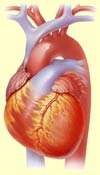|
|
 Heart
Smart Test Heart
Smart Test First, the bad news: the odds are against us. All adults, both men and women, are at risk of a devastating heart attack or stroke. Some of us have been warned, some haven't. However, fully half of all heart attack victims were not considered medically at risk prior to their attack! That's incredibly scary. They didn't have elevated blood pressure or high cholesterol or family history of heart disease. They exercised regularly, managed stress, and ate reasonable diets. But they still suffered a heart attack. Fortunately, there's good news: a new, inexpensive blood test that can help you and your doctor better gauge your risk for heart disease… and guide the treatment for it. The test measures something called "high-sensitivity C-reactive protein" or CRP for short. CRP is an accurate "marker" for inflammation of arterial walls. (Remember, many heart attacks and strokes occur when blood vessels are blocked by plaques -- deposits of fatty material -- and these clots often begin as inflammation of blood vessel walls.) A second independent marker is called Lp-PLA2 (lipoprotein-associated phospholipase A2). By "independent," I mean that elevated levels of Lp-PLA2 or CRP are directly correlated with coronary heart disease, independently of LDL (bad) cholesterol levels. That's why, even if you have "low cholesterol," you should ask your doctor to measure your CRP and/or Lp-PLA2 levels to gauge your risk. The CRP test isn't expensive ($25-$50) and is probably reimbursed by your insurance. If your CRP comes back elevated (above 3 milligrams per liter), you've been warned. You should therefore seriously consider further improving your diet, losing additional weight, and exercising more. Your doctor may also prescribe statin drugs such as Lipitor. Although unproven at this time, there is speculation that statins will reduce CRP as well as bad cholesterol levels. |
